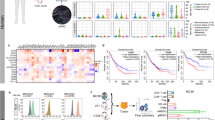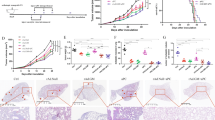Abstract
Genetic immunotherapy is considered an ideal treatment modality for cancer because of its systemic nature. This study was designed to develop a potent novel genetic immunotherapy by combining conditionally replicating adenovirus (CRAd) and replication-defective adenovirus expressing interferon-β (ad-IFN-β). We investigated the efficacy of this therapy in an immunocompetent mouse tumor model. Transduction with CRAd (Δ24RGD) induced cytolysis in a mouse lung cancer cell line (Lewis lung carcinoma (LLC)). Combined transduction of ad-IFN-β and Δ24RGD in the LLC cells induced a greater and more prolonged production of IFN-β. Media transfer from the LLC-Δ24RGD-ad-IFN-β to untransduced LLC cells induced the production of IFN-β; these results confirmed the replication and release of ad-IFN-β. LLC cells transduced with ad-IFN-β and Δ24RGD had decreased tumorigenicity in syngeneic mice. Tumor vaccination with irradiated LLC-ad-IFN-β-Δ24RGD showed a significant increase in the survival of tumor-bearing syngeneic mice compared with mice with a single transduced LLC vaccination; this was mediated by an enhanced cytotoxic T-lymphocyte response against the LLC cells. The results of this study showed that cotransduced Δ24RGD to ad-IFN-β aided the replication of ad-IFN-β in the LLC cells. A high local concentration of IFN-β and local release of tumor antigen by CRAd induced strong antitumor immunity. This combination strategy might provide a powerful means by which ad-cytokines and CRAd can be combined and other adenoviruses expressing different cytokines might also be used.
This is a preview of subscription content, access via your institution
Access options
Subscribe to this journal
Receive 12 print issues and online access
$259.00 per year
only $21.58 per issue
Buy this article
- Purchase on Springer Link
- Instant access to full article PDF
Prices may be subject to local taxes which are calculated during checkout








Similar content being viewed by others
References
Lee CT, Chen HL, Carbone DP . Gene therapy for lung cancer. Ann Oncol 1995; 6 (Suppl 3): S61–S63.
Dranoff G, Jaffee E, Lazenby A, Golumbek P, Levitsky H, Brose K et al. Vaccination with irradiated tumor cells engineered to secrete murine granulocyte-macrophage colony-stimulating factor stimulates potent, specific, and long-lasting anti-tumor immunity. Proc Natl Acad Sci USA 1993; 90: 3539–3543.
Dranoff G, Soiffer R, Lynch T, Mihm M, Jung K, Kolesar K et al. A phase I study of vaccination with autologous, irradiated melanoma cells engineered to secrete human granulocyte-macrophage colony stimulating factor. Hum Gene Ther 1997; 8: 111–123.
Salgia R, Lynch T, Skarin A, Lucca J, Lynch C, Jung K et al. Vaccination with irradiated autologous tumor cells engineered to secrete granulocyte-macrophage colony-stimulating factor augments antitumor immunity in some patients with metastatic non-small-cell lung carcinoma. J Clin Oncol 2003; 21: 624–630.
Soiffer R, Hodi FS, Haluska F, Jung K, Gillessen S, Singer S et al. Vaccination with irradiated, autologous melanoma cells engineered to secrete granulocyte-macrophage colony-stimulating factor by adenoviral-mediated gene transfer augments antitumor immunity in patients with metastatic melanoma. J Clin Oncol 2003; 21: 3343–3350.
Bischoff JR, Kirn DH, Williams A, Heise C, Horn S, Muna M et al. An adenovirus mutant that replicates selectively in p53-deficient human tumor cells. Science 1996; 274: 373–376.
Heise C, Sampson-Johannes A, Williams A, McCormick F, Von Hoff DD, Kirn DH . ONYX-015, an E1B gene-attenuated adenovirus, causes tumor-specific cytolysis and antitumoral efficacy that can be augmented by standard chemotherapeutic agents. Nat Med 1997; 3: 639–645.
Heise C, Hermiston T, Johnson L, Brooks G, Sampson-Johannes A, Williams A et al. An adenovirus E1A mutant that demonstrates potent and selective systemic anti-tumoral efficacy. Nat Med 2000; 6: 1134–1139.
Hermiston TW, Kuhn I . Armed therapeutic viruses: strategies and challenges to arming oncolytic viruses with therapeutic genes. Cancer Gene Ther 2002; 9: 1022–1035.
Nanda D, Vogels R, Havenga M, Avezaat CJ, Bout A, Smitt PS . Treatment of malignant gliomas with a replicating adenoviral vector expressing herpes simplex virus-thymidine kinase. Cancer Res 2001; 61: 8743–8750.
Ren XW, Liang M, Meng X, Ye X, Ma H, Zhao Y et al. A tumor-specific conditionally replicative adenovirus vector expressing TRAIL for gene therapy of hepatocellular carcinoma. Cancer Gene Ther 2006; 13: 159–168.
Bristol JA, Zhu M, Ji H, Mina M, Xie Y, Clarke L et al. In vitro and in vivo activities of an oncolytic adenoviral vector designed to express GM-CSF. Mol Ther 2003; 7: 755–764.
Zhao L, Gu J, Dong A, Zhang Y, Zhong L, He L et al. Potent antitumor activity of oncolytic adenovirus expressing mda-7/IL-24 for colorectal cancer. Hum Gene Ther 2005; 16: 845–858.
Su C, Peng L, Sham J, Wang X, Zhang Q, Chua D et al. Immune gene-viral therapy with triplex efficacy mediated by oncolytic adenovirus carrying an interferon-gamma gene yields efficient antitumor activity in immunodeficient and immunocompetent mice. Mol Ther 2006; 13: 918–927.
Choi KJ, Kim JH, Lee YS, Kim J, Suh BS, Kim H et al. Concurrent delivery of GM-CSF and B7-1 using an oncolytic adenovirus elicits potent antitumor effect. Gene Ther 2006; 13: 1010–1020.
Lee YS, Kim JH, Choi KJ, Choi IK, Kim H, Cho S et al. Enhanced antitumor effect of oncolytic adenovirus expressing interleukin-12 and B7-1 in an immunocompetent murine model. Clin Cancer Res 2006; 12: 5859–5868.
Lee CT, Park KH, Yanagisawa K, Adachi Y, Ohm JE, Nadaf S et al. Combination therapy with conditionally replicating adenovirus and replication defective adenovirus. Cancer Res 2004; 64: 6660–6665.
Lee CT, Lee YJ, Kwon SY, Lee J, Kim KI, Park KH et al. In vivo imaging of adenovirus transduction and enhanced therapeutic efficacy of combination therapy with conditionally replicating adenovirus and adenovirus-p27. Cancer Res 2006; 66: 372–377.
Wilderman MJ, Sun J, Jassar AS, Kapoor V, Khan M, Vachani A et al. Intrapulmonary IFN-beta gene therapy using an adenoviral vector is highly effective in a murine orthotopic model of bronchogenic adenocarcinoma of the lung. Cancer Res 2005; 65: 8379–8387.
Yoshida J, Mizuno M, Wakabayashi T . Interferon-beta gene therapy for cancer: basic research to clinical application. Cancer Sci 2004; 95: 858–865.
Sterman DH, Recio A, Carroll RG, Gillespie CT, Haas A, Vachani A et al. A phase I clinical trial of single-dose intrapleural IFN-beta gene transfer for malignant pleural mesothelioma and metastatic pleural effusions: high rate of antitumor immune responses. Clin Cancer Res 2007; 13 (15 Pt 1): 4456–4466.
Suzuki K, Fueyo J, Krasnykh V, Reynolds PN, Curiel DT, Alemany R . A conditionally replicative adenovirus with enhanced infectivity shows improved oncolytic potency. Clin Cancer Res 2001; 7: 120–126.
Yang SC, Hillinger S, Riedl K, Zhang L, Zhu L, Huang M et al. Intratumoral administration of dendritic cells overexpressing CCL21 generates systemic antitumor responses and confers tumor immunity. Clin Cancer Res 2004; 10: 2891–2901.
Nemunaitis J, Jahan T, Ross H, Sterman D, Richards D, Fox B et al. Phase 1/2 trial of autologous tumor mixed with an allogeneic GVAX vaccine in advanced-stage non-small-cell lung cancer. Cancer Gene Ther 2006; 13: 555–562.
Heemskerk B, Liu K, Dudley ME, Johnson LA, Kaiser A, Downey S et al. Adoptive cell therapy for patients with melanoma, using tumor-infiltrating lymphocytes genetically engineered to secrete interleukin-2. Hum Gene Ther 2008; 19: 496–510.
Tong AW, Nemunaitis J, Su D, Zhang Y, Cunningham C, Senzer N et al. Intratumoral injection of INGN 241, a nonreplicating adenovector expressing the melanoma-differentiation associated gene-7 (mda-7/IL24): biologic outcome in advanced cancer patients. Mol Ther 2005; 11: 160–172.
Jogler C, Hoffmann D, Theegarten D, Grunwald T, Uberla K, Wildner O . Replication properties of human adenovirus in vivo and in cultures of primary cells from different animal species. J Virol 2006; 80: 3549–3558.
Thomas MA, Spencer JF, La Regina MC, Dhar D, Tollefson AE, Toth K et al. Syrian hamster as a permissive immunocompetent animal model for the study of oncolytic adenovirus vectors. Cancer Res 2006; 66: 1270–1276.
Guo W, Zhu H, Zhang L, Davis J, Teraishi F, Roth JA et al. Combination effect of oncolytic adenovirotherapy and TRAIL gene therapy in syngeneic murine breast cancer models. Cancer Gene Ther 2006; 13: 82–90.
Soiffer R, Lynch T, Mihm M, Jung K, Rhuda C, Schmollinger JC et al. Vaccination with irradiated autologous melanoma cells engineered to secrete human granulocyte-macrophage colony-stimulating factor generates potent antitumor immunity in patients with metastatic melanoma. Proc Natl Acad Sci USA 1998; 95: 13141–13146.
Bernt KM, Ni S, Tieu AT, Lieber A . Assessment of a combined, adenovirus-mediated oncolytic and immunostimulatory tumor therapy. Cancer Res 2005; 65: 4343–4352.
Luo J, Xia Q, Zhang R, Lv C, Zhang W, Wang Y et al. Treatment of cancer with a novel dual-targeted conditionally replicative adenovirus armed with mda-7/IL-24 gene. Clin Cancer Res 2008; 14: 2450–2457.
Ramesh N, Ge Y, Ennist DL, Zhu M, Mina M, Ganesh S et al. CG0070, a conditionally replicating granulocyte macrophage colony-stimulating factor—armed oncolytic adenovirus for the treatment of bladder cancer. Clin Cancer Res 2006; 12: 305–313.
Zhu M, Bristol JA, Xie Y, Mina M, Ji H, Forry-Schaudies S et al. Linked tumor-selective virus replication and transgene expression from E3-containing oncolytic adenoviruses. J Virol 2005; 79: 5455–5465.
Acknowledgements
This work is supported by the Health & Medical Technology R&D program of Korea (A060195).
Author information
Authors and Affiliations
Corresponding author
Ethics declarations
Competing interests
The authors declare no conflict of interest.
Rights and permissions
About this article
Cite this article
Park, MY., Kim, D., Jung, H. et al. Genetic immunotherapy of lung cancer using conditionally replicating adenovirus and adenovirus-interferon-β. Cancer Gene Ther 17, 356–364 (2010). https://doi.org/10.1038/cgt.2009.78
Received:
Revised:
Accepted:
Published:
Issue Date:
DOI: https://doi.org/10.1038/cgt.2009.78
Keywords
This article is cited by
-
Suppression of Autophagy Enhanced Growth Inhibition and Apoptosis of Interferon-β in Human Glioma Cells
Molecular Neurobiology (2013)
-
The impact of intraoperative vaccination with IL-12 modified autologous tumor cells in the Lewis lung carcinoma mouse model
Journal of Cancer Research and Clinical Oncology (2012)



